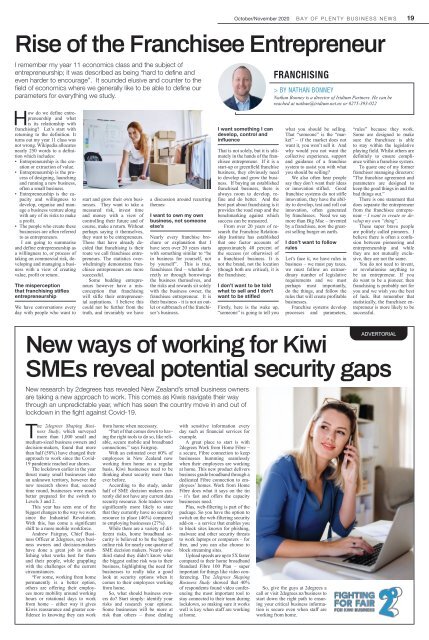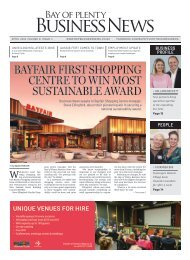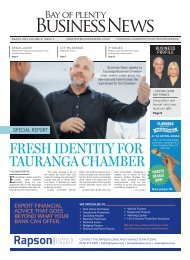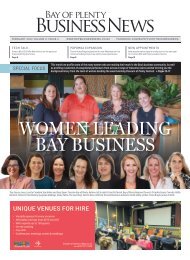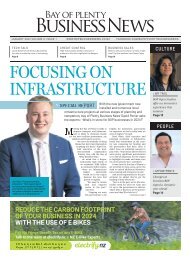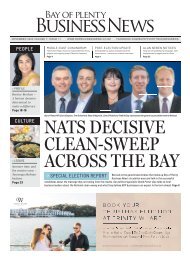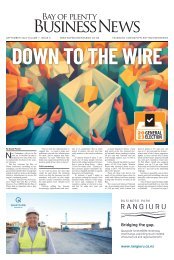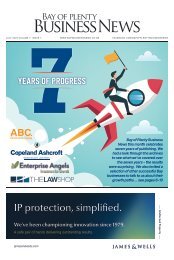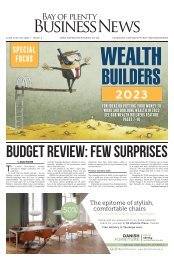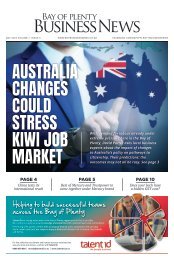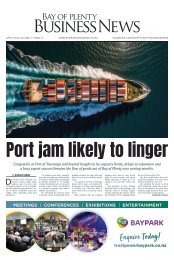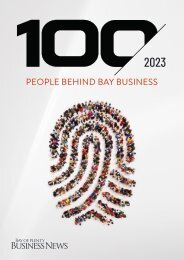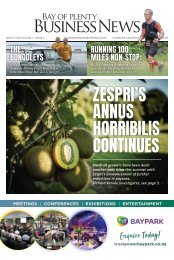October/November 2020 - Bay of Plenty Business News
From mid-2016 Bay of Plenty businesses have a new voice, Bay of Plenty Business News. This new publication reflects the region’s growth and importance as part of the wider central North Island economy.
From mid-2016 Bay of Plenty businesses have a new voice, Bay of Plenty Business News. This new publication reflects the region’s growth and importance as part of the wider central North Island economy.
Create successful ePaper yourself
Turn your PDF publications into a flip-book with our unique Google optimized e-Paper software.
<strong>October</strong>/<strong>November</strong> <strong>2020</strong> BAY OF PLENTY BUSINESS NEWS 19<br />
Rise <strong>of</strong> the Franchisee Entrepreneur<br />
I remember my year 11 economics class and the subject <strong>of</strong><br />
entrepreneurship; it was described as being “hard to define and<br />
even harder to encourage”. It sounded elusive and counter to the<br />
field <strong>of</strong> economics where we generally like to be able to define our<br />
parameters for everything we study.<br />
How do we define entrepreneurship<br />
and what<br />
is its relationship with<br />
franchising? Let’s start with<br />
returning to the definition. It<br />
turns out my year 11 class was<br />
not wrong. Wikipedia allocates<br />
nearly 250 words to a definition<br />
which includes:<br />
• Entrepreneurship is the creation<br />
or extraction <strong>of</strong> value.<br />
• Entrepreneurship is the process<br />
<strong>of</strong> designing, launching<br />
and running a new business,<br />
<strong>of</strong>ten a small business.<br />
• Entrepreneurship is the capacity<br />
and willingness to<br />
develop, organise and manage<br />
a business venture along<br />
with any <strong>of</strong> its risks to make<br />
a pr<strong>of</strong>it.<br />
• The people who create these<br />
businesses are <strong>of</strong>ten referred<br />
to as entrepreneurs.<br />
I am going to summarise<br />
and define entrepreneurship as<br />
a willingness to, or process <strong>of</strong><br />
taking on commercial risk, developing<br />
and managing a business<br />
with a view <strong>of</strong> creating<br />
value, pr<strong>of</strong>it or return.<br />
The misperception<br />
that franchising stifles<br />
entrepreneurship<br />
We have conversations every<br />
day with people who want to<br />
start and grow their own businesses.<br />
They want to take a<br />
measured risk, invest time<br />
and money with a view <strong>of</strong><br />
controlling their future and <strong>of</strong><br />
course, make a return. Without<br />
perhaps saying it themselves,<br />
they want to be entrepreneurs.<br />
Those that have already decided<br />
that franchising is their<br />
route we call franchisee entrepreneurs.<br />
The statistics overwhelmingly<br />
demonstrate franchisee<br />
entrepreneurs are more<br />
successful.<br />
Some budding entrepreneurs<br />
however have a misconception<br />
that franchising<br />
will stifle their entrepreneurial<br />
aspirations. I believe this<br />
could not be further from the<br />
truth, and invariably we have<br />
a discussion around recurring<br />
themes:<br />
I want to own my own<br />
business, not someone<br />
else’s<br />
Nearly every franchise brochure<br />
or explanation that I<br />
have seen over 20 years starts<br />
with something similar to “be<br />
in business for yourself, not<br />
by yourself”. This is true,<br />
franchisees find – whether directly<br />
or through borrowings<br />
the business themselves, and<br />
the risks and rewards sit solely<br />
with the business owner, the<br />
franchisee entrepreneur. It is<br />
their business - it is not an outlet<br />
or subbranch <strong>of</strong> the franchisor’s<br />
business.<br />
I want something I can<br />
develop, control and<br />
influence<br />
That is not solely, but it is ultimately<br />
in the hands <strong>of</strong> the franchisee<br />
entrepreneur. If it is a<br />
start-up or greenfield franchise<br />
business, they obviously need<br />
to develop and grow the business.<br />
If buying an established<br />
franchised business, there is<br />
always room to develop, refine<br />
and do better. And the<br />
best part about franchising is it<br />
provides the road map and the<br />
benchmarking against which<br />
success can be measured.<br />
From over 20 years <strong>of</strong> research<br />
the Franchise Relationship<br />
Institute has established<br />
that one factor accounts <strong>of</strong><br />
approximately 40 percent <strong>of</strong><br />
the success (or otherwise) <strong>of</strong><br />
a franchised business. It is<br />
not the brand, not the location<br />
(though both are critical), it is<br />
the franchisee.<br />
I don’t want to be told<br />
what to sell and I don’t<br />
want to be stifled<br />
Firstly, here is the wake up,<br />
“someone” is going to tell you<br />
FRANCHISING<br />
> BY NATHAN BONNEY<br />
Nathan Bonney is a director <strong>of</strong> Iridium Partners. He can be<br />
reached at nathan@iridium.net.nz or 0275-393-022<br />
what you should be selling.<br />
That “someone” is the “market”<br />
– if the market does not<br />
want it, you won’t sell it. And<br />
why would you not want the<br />
collective experience, support<br />
and guidance <strong>of</strong> a franchise<br />
system to assist you with what<br />
you should be selling?<br />
We also <strong>of</strong>ten hear people<br />
say they don’t want their ideas<br />
or innovation stifled. Good<br />
franchise systems do not stifle<br />
innovation, they have the ability<br />
to develop, test and roll out<br />
innovation, <strong>of</strong>ten generated<br />
by franchisees. Need we say<br />
more than Big Mac – invented<br />
by a franchisee, now the greatest<br />
selling burger on earth.<br />
I don’t want to follow<br />
rules<br />
Let’s face it, we have rules in<br />
business – we must pay taxes,<br />
we must follow an extraordinary<br />
number <strong>of</strong> legislative<br />
requirements and we must<br />
perhaps most importantly,<br />
do the things, and follow the<br />
rules that will create pr<strong>of</strong>itable<br />
businesses.<br />
Franchise systems develop<br />
processes and parameters,<br />
“rules” because they work.<br />
Some are designed to make<br />
sure the franchisee is able<br />
to stay within the legislative<br />
playing field. Whilst others are<br />
definitely to ensure compliance<br />
within a franchise system.<br />
To quote one <strong>of</strong> my former<br />
franchisor managing directors:<br />
“The franchise agreement and<br />
parameters are designed to<br />
keep the good things in and the<br />
bad things out.”<br />
There is one statement that<br />
does separate the entrepreneur<br />
from the franchisee entrepreneur<br />
– I want to create or develop<br />
my own “thing”.<br />
These super brave people<br />
are politely called pioneers. I<br />
believe there is <strong>of</strong>ten a confusion<br />
between pioneering and<br />
entrepreneurship and while<br />
they are not mutually exclusive,<br />
they are not the same.<br />
You do not need to invent,<br />
or revolutionise anything to<br />
be an entrepreneur. If you<br />
do want to be a pioneer, then<br />
franchising is probably not for<br />
you and we wish you the best<br />
<strong>of</strong> luck. But remember that<br />
statistically, the franchisee entrepreneur<br />
is more likely to be<br />
successful.<br />
New ways <strong>of</strong> working for Kiwi<br />
SMEs reveal potential security gaps<br />
ADVERTORIAL<br />
New research by 2degrees has revealed New Zealand’s small business owners<br />
are taking a new approach to work. This comes as Kiwis navigate their way<br />
through an unpredictable year, which has seen the country move in and out <strong>of</strong><br />
lockdown in the fight against Covid-19.<br />
The 2degrees Shaping <strong>Business</strong><br />
Study, which surveyed<br />
more than 1,000 small and<br />
medium-sized business owners and<br />
decision-makers, found that more<br />
than half (58%) have changed their<br />
approach to work since the Covid-<br />
19 pandemic reached our shores.<br />
The lockdown earlier in the year<br />
thrust many small businesses into<br />
an unknown territory, however the<br />
new research shows that, second<br />
time round, businesses were much<br />
better prepared for the switch to<br />
Levels 3 and 2.<br />
This year has seen one <strong>of</strong> the<br />
biggest changes to the way we work<br />
since the Industrial Revolution.<br />
With this, has come a significant<br />
shift to a more mobile workforce.<br />
Andrew Fairgray, Chief <strong>Business</strong><br />
Officer at 2degrees, says business<br />
owners and decision-makers<br />
have done a great job in establishing<br />
what works best for them<br />
and their people, while grappling<br />
with the challenges <strong>of</strong> the current<br />
circumstances.<br />
“For some, working from home<br />
permanently is a better option,<br />
others are <strong>of</strong>fering their employees<br />
more mobility around working<br />
hours or rotational days to work<br />
from home – either way it gives<br />
Kiwis reassurance and greater confidence<br />
in knowing they can work<br />
from home when necessary.<br />
“Part <strong>of</strong> that comes down to having<br />
the right tools to do so, like reliable,<br />
secure mobile and broadband<br />
connections.” says Fairgray.<br />
With an estimated over 60% <strong>of</strong><br />
employees in New Zealand now<br />
working from home on a regular<br />
basis, Kiwi businesses need to be<br />
thinking about security more than<br />
ever before.<br />
According to the study, under<br />
half <strong>of</strong> SME decision makers currently<br />
did not have any current data<br />
security resource. Sole traders were<br />
significantly more likely to state<br />
that they currently have no security<br />
resource in place (46%) compared<br />
to employing businesses (27%).<br />
While there are a variety <strong>of</strong> different<br />
risks, home broadband security<br />
is believed to be the biggest<br />
online risk for nearly one quarter <strong>of</strong><br />
SME decision makers. Nearly onethird<br />
stated they didn’t know what<br />
the biggest online risk was to their<br />
business, highlighting the need for<br />
businesses to really take a good<br />
look at security options when it<br />
comes to their employees working<br />
from home.<br />
So, what should business owners<br />
do? Start simply: identify your<br />
risks and research your options.<br />
Some businesses will be more at<br />
risk than others – those dealing<br />
with sensitive information every<br />
day such as financial services for<br />
example.<br />
A great place to start is with<br />
2degrees Work from Home Fibre –<br />
a secure, Fibre connection to keep<br />
businesses humming seamlessly<br />
when their employees are working<br />
at home. This new product delivers<br />
business grade broadband through a<br />
dedicated Fibre connection to employees’<br />
homes. Work from Home<br />
Fibre does what it says on the tin<br />
– it’s fast and <strong>of</strong>fers the capacity<br />
businesses need.<br />
Plus, web-filtering is part <strong>of</strong> the<br />
package. So you have the option to<br />
switch on the web-filtering security<br />
add-on – a service that enables you<br />
to block sites known for phishing,<br />
malware and other security threats<br />
to work laptops or computers – for<br />
free, and you can also choose to<br />
block streaming sites.<br />
Upload speeds are up to 5X faster<br />
compared to their home broadband<br />
Standard Fibre 100 Plan – super<br />
important for things like video conferencing.<br />
The 2degrees Shaping<br />
<strong>Business</strong> Study showed that 40%<br />
<strong>of</strong> respondents found video conferencing<br />
the most important tool to<br />
stay connected to their team during<br />
lockdown, so making sure it works<br />
well is key when staff are working<br />
at home.<br />
So, give the guys at 2degrees a<br />
call or visit 2degrees.nz/business to<br />
start down the right path to ensuring<br />
your critical business information<br />
is secure even when staff are<br />
working from home.


